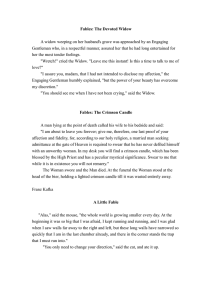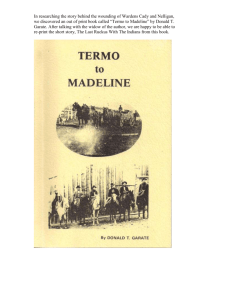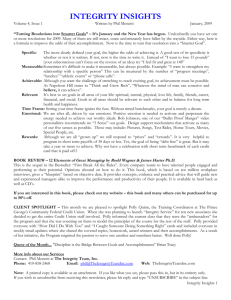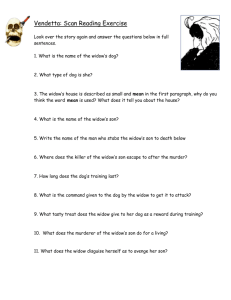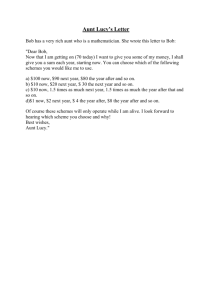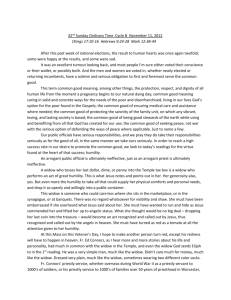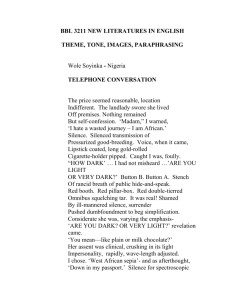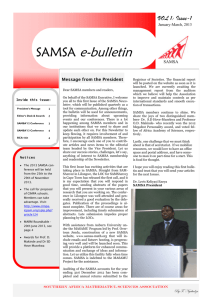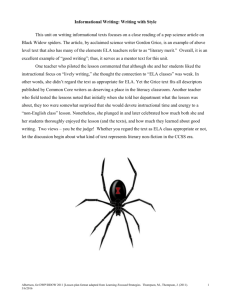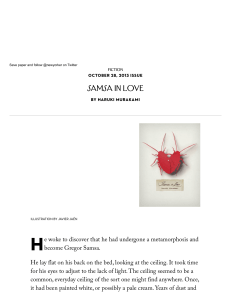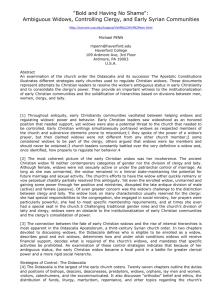Camus The Stranger
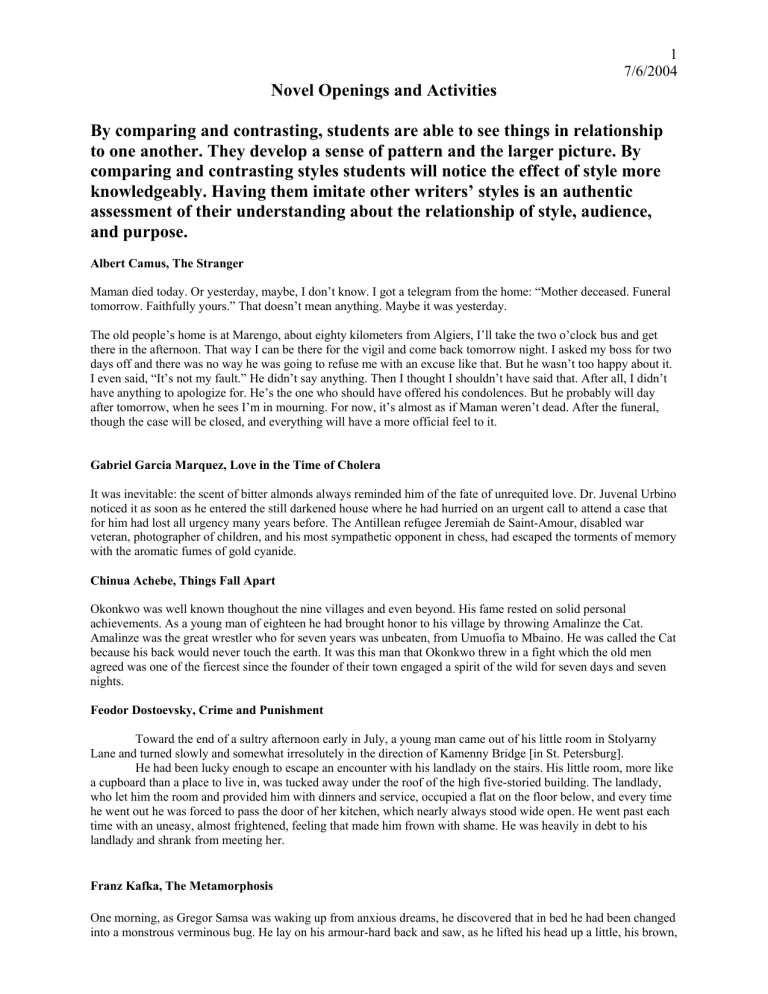
1
7/6/2004
Novel Openings and Activities
By comparing and contrasting, students are able to see things in relationship to one another. They develop a sense of pattern and the larger picture. By comparing and contrasting styles students will notice the effect of style more knowledgeably. Having them imitate other writers’ styles is an authentic assessment of their understanding about the relationship of style, audience, and purpose.
Albert Camus, The Stranger
Maman died today. Or yesterday, maybe, I don’t know. I got a telegram from the home: “Mother deceased. Funeral tomorrow. Faithfully yours.” That doesn’t mean anything. Maybe it was yesterday.
The old people’s home is at Marengo, about eighty kilometers from Algiers, I’ll take the two o’clock bus and get there in the afternoon. That way I can be there for the vigil and come back tomorrow night. I asked my boss for two days off and there was no way he was going to refuse me with an excuse like that. But he wasn’t too happy about it.
I even said, “It’s not my fault.” He didn’t say anything. Then I thought I shouldn’t have said that. After all, I didn’t have anything to apologize for. He’s the one who should have offered his condolences. But he probably will day after tomorrow, when he sees I’m in mourning. For now, it’s almost as if Maman weren’t dead. After the funeral, though the case will be closed, and everything will have a more official feel to it.
Gabriel Garcia Marquez, Love in the Time of Cholera
It was inevitable: the scent of bitter almonds always reminded him of the fate of unrequited love. Dr. Juvenal Urbino noticed it as soon as he entered the still darkened house where he had hurried on an urgent call to attend a case that for him had lost all urgency many years before. The Antillean refugee Jeremiah de Saint-Amour, disabled war veteran, photographer of children, and his most sympathetic opponent in chess, had escaped the torments of memory with the aromatic fumes of gold cyanide.
Chinua Achebe, Things Fall Apart
Okonkwo was well known thoughout the nine villages and even beyond. His fame rested on solid personal achievements. As a young man of eighteen he had brought honor to his village by throwing Amalinze the Cat.
Amalinze was the great wrestler who for seven years was unbeaten, from Umuofia to Mbaino. He was called the Cat because his back would never touch the earth. It was this man that Okonkwo threw in a fight which the old men agreed was one of the fiercest since the founder of their town engaged a spirit of the wild for seven days and seven nights.
Feodor Dostoevsky, Crime and Punishment
Toward the end of a sultry afternoon early in July, a young man came out of his little room in Stolyarny
Lane and turned slowly and somewhat irresolutely in the direction of Kamenny Bridge [in St. Petersburg].
He had been lucky enough to escape an encounter with his landlady on the stairs. His little room, more like a cupboard than a place to live in, was tucked away under the roof of the high five-storied building. The landlady, who let him the room and provided him with dinners and service, occupied a flat on the floor below, and every time he went out he was forced to pass the door of her kitchen, which nearly always stood wide open. He went past each time with an uneasy, almost frightened, feeling that made him frown with shame. He was heavily in debt to his landlady and shrank from meeting her.
Franz Kafka, The Metamorphosis
One morning, as Gregor Samsa was waking up from anxious dreams, he discovered that in bed he had been changed into a monstrous verminous bug. He lay on his armour-hard back and saw, as he lifted his head up a little, his brown,
2
7/6/2004 arched abdomen divided up into rigid bow-like sections. From this height the blanket, just about ready to slide off completely, could hardly stay in place. His numerous legs, pitifully thin in comparison to the rest of his circumference, flickered helplessly before his eyes.
"What's happened to me," he thought. It was no dream. His room, a proper room for a human being, only somewhat too small, lay quietly between the four well-known walls. Above the table, on which an unpacked collection of sample cloth goods was spread out — Samsa was a travelling salesman — hung the picture which he had cut out of an illustrated magazine a little while ago and set in a pretty gilt frame. It was a picture of a woman with a fur hat and a fur boa. She sat erect there, lifting up in the direction of the viewer a solid fur muff into which her entire forearm had disappeared.
Charles Dickens, The Tale of Two Cities
"It was the best of times, it was the worst of times, it was the age of wisdom, it was the age of foolishness, it was the epoch of belief, it was the epoch of incredulity, it was the season of Light, it was the season of Darkness, it was the spring of hope, it was the winter of despair, we had everything before us, we had nothing before us, we were all going direct to heaven, we were all going direct the other way – in short, the period was so far like the present period, that some of its noisiest authorities insisted on its being received, for good or for evil, in the superlative degree of comparison only.
There were a king with a large jaw and a queen with a plain face, on the throne of England; there were a king with a large jaw and a queen with a fair face, on the throne of France. In both countries it was clearer than crystal to the lords of the State preserves of loaves and fishes, that things in general were settled for ever.
It was the year of Our Lord one thousand seven hundred and seventy-five. Spiritual revelations were conceded to
England at that favoured period, as at this….
Daniel DeFoe, Robinson Crusoe
1719
I was born in the year 1632, in the city of York, of a good family, though not of that country, my father being a foreigner of Bremen, who settled first at Hull. He got a good estate by merchandise, and leaving off his trade lived afterward at York, from whence he had married my mother, whose relations were named Robinson, a good family in that country, and from whom I was called Robinson Kreutznear; but by the usual corruption of words in England we are now called, nay, we call ourselves, and write our name, Crusoe, and so my companions always called me.
I had two elder brothers, one of which was lieutenant-colonel to an English regiment of foot in Flanders, formerly commanded by the famous Colonel Lockhart, and was killed at the battle near Dunkirk against the Spaniards; what became of my second brother I never knew, any more than my father and mother did know what was become of me.
Being the third son of the family, and not bred to any trade, my head began to be filled very early with rambling thoughts. My father, who was very ancient, had given me a competent share of learning, as far as house-education and a country free school generally goes, and designed me for the law, but I would be satisfied with nothing but going to sea; and my inclination to this led me so strongly against the will, nay, the commands, of my father, and against all the entreaties and persuasions of my mother and other friends, that there seemed to be something fatal in that propension of nature tending directly to the life of misery which was to befall me
Mark Twain, Huckleberry Finn
You don’t know about me without you have read a book by the name of The Adventures of Tom Sawyer; but that ain't no matter. That book was made by Mr. Mark Twain, and he told the truth, mainly. There was things which he stretched, but mainly he told the truth. That is nothing. I never seen anybody but lied one time or another, without it
3
7/6/2004 was Aunt Polly, or the widow, or maybe Mary. Aunt Polly -- Tom's Aunt Polly, she is -- and Mary, and the Widow
Douglas is all told about in that book, which is mostly a true book, with some stretchers, as I said before.
Now the way that the book winds up is this: Tom and me found the money that the robbers hid in the cave, and it made us rich. We got six thousand dollars apiece -- all gold. It was an awful sight of money when it was piled up.
Well, Judge Thatcher he took it and put it out at interest, and it fetched us a dollar a day apiece all the year round -- more than a body could tell what to do with. The Widow Douglas she took me for her son, and allowed she would sivilize me; but it was rough living in the house all the time, considering how dismal regular and decent the widow was in all her ways; and so when I couldn't stand it no longer I lit out. I got into my old rags and my sugar-hogshead again, and was free and satisfied. But Tom Sawyer he hunted me up and said he was going to start a band of robbers, and I might join if I would go back to the widow and be respectable. So I went back.
********************************************
Activities:
9 Analyze any one for diction / level of diction, syntax, rhetorical devices, mood, tone, point of view, attitude, choice of details, organization, style, elements of fiction etc. Determine the achieved effect and purpose.
9 Write an AP style prompt after completing the above.
9 Construct a Venn diagram to compare and contrast two or more of these openings for style and effect.
9
Imitate the style of one or more to write your personal biography as a novel.
9 Your suggestions?

